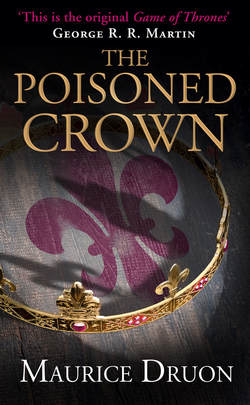Читать книгу The Poisoned Crown - Морис Дрюон - Страница 9
Prologue
ОглавлениеPHILIP THE FAIR HAD been dead six months. To the government of that remarkable monarch France owed the benefits of a long period of peace, the abandonment of disastrous overseas adventures, the organization of a powerful network of alliances and suzerainties, notable increases of territory by union rather than conquest, a definite economic expansion and a relative stability of currency, the non-interference of the Church in temporal affairs, the control of wealth and large private interests, the expression of the voice of the people in the councils of power, the security of the individual, and the organization of State administration.
His contemporaries were naturally not always very conscious of these ameliorations. Progress has never meant perfection. Some years were less prosperous than others, there were periods of crisis and revolution; the needs of the people were far from being satisfied. The Iron King had methods of making himself obeyed which were not to everyone’s taste; and he was more concerned with the grandeur of his Kingdom than with the individual happiness of his subjects.
Nevertheless, when he died, France was the foremost, wealthiest, and most powerful of all the nations of the western world.
It took his successors thirty years of perseverance to destroy his work, and, inordinate ambition alternating upon the throne with extreme incompetence, to open the country to invasion, deliver society over to anarchy, and reduce the population to the lowest condition of misery and despair.
In the long succession of vain imbeciles who, from Louis X, The Hutin, to Jean the Good inclusive, were to wear the crown, there was to be but one exception: Philippe V, the Long, second son of Philip the Fair, who returned to the methods and principles of his father – even though his passion for reigning led him to commit crimes and invent dynastic laws which led directly to the Hundred Years War.
The processes of decay were therefore to continue during a third of a century, but it must be admitted that a great part of the destruction was completed during the first six months.
Institutions were not sufficiently stable to be able to function without the personal intervention of the sovereign.
The feeble, nervous, and incompetent Louis X, overwhelmed from the very first day by the magnitude of his task, resigned the cares of power to his uncle, Charles of Valois, who was, it appears, a good soldier though a detestable politician, who spent his whole life searching for a throne and had now, at last, found an outlet for his turbulent blundering.
The middle-class ministers, who had been the backbone of the preceding reign, had been imprisoned, and the skeleton of the most remarkable of them all, Enguerrand de Marigny, once Rector-General of the Kingdom, was bleaching on the forks of the gibbet of Montfaucon.
Reaction was triumphant; the Barons’ Leagues were sowing disorder in the provinces and subverting the royal authority. The great Lords, Charles of Valois at their head, minted their own currency which they circulated throughout the country to their own personal profit. The Administration, no longer held in check, became corrupt, and the Treasury was empty.
A disastrous harvest, followed by an exceptionally hard winter, caused famine. The death-rate was rising.
During this time Louis X had been mainly preoccupied with repairing his domestic honour and endeavouring to efface, if it were possible, the scandal of the Tower of Nesle.
For lack of a Pope, whom the Conclave seemed unable to elect, and who was required for the purpose of pronouncing an annulment, the young King of France, so that he might remarry, had had his wife, Marguerite of Burgundy, strangled in the prison of Château-Gaillard.
Thus he became free to marry the beautiful Neapolitan Princess who had been found for him, and with whom he was making preparations to share the felicities of a long reign.fn1
